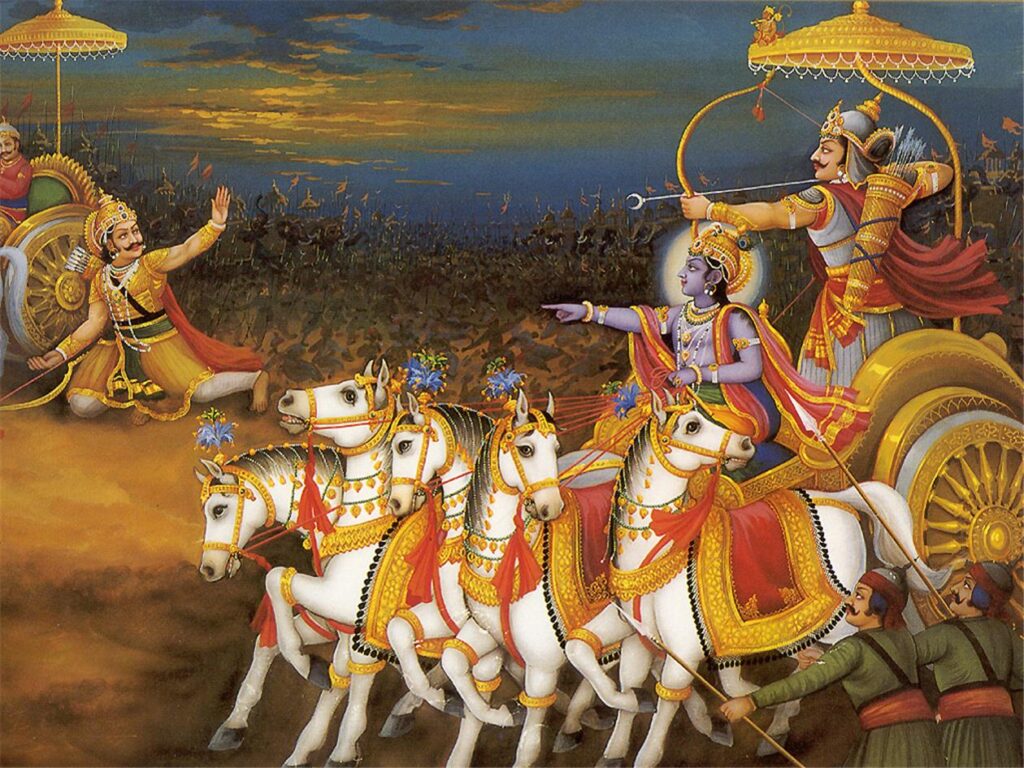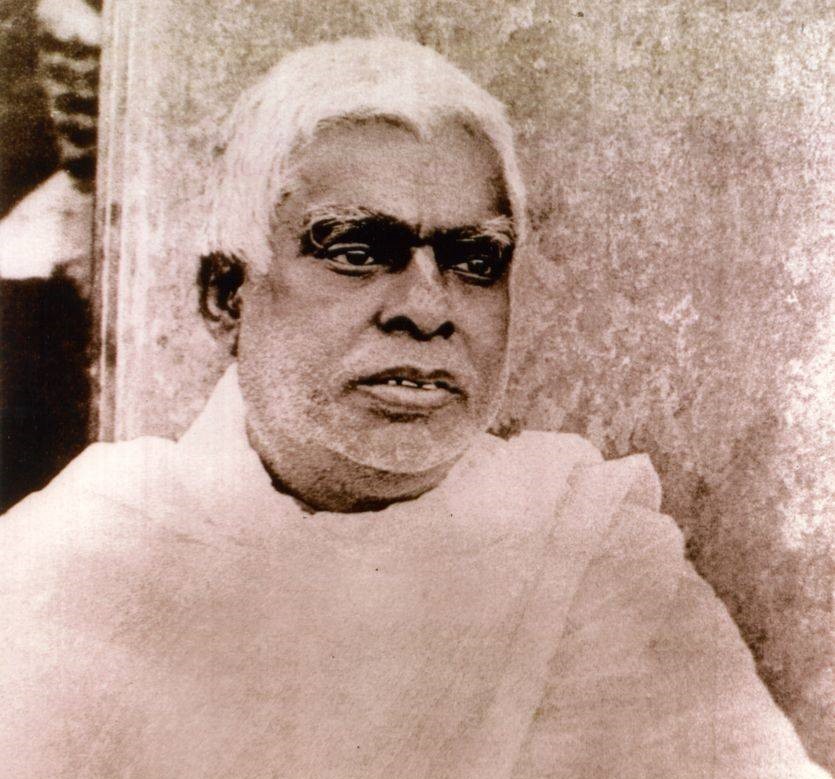Question: I have been battling lately with how to balance being a mother and my spiritual life. I no longer buy meat for my family, and they have definitely pulled away and do not feel supported by me. I am trying to please Krishna with my life, and my children feel I have neglected them, which I don’t feel is good because they are Krishna’s children too.
I just feel a little lost and my family life is not very nice at all at the moment. I know this is nothing compared to the challenges faced by the mighty Arjuna, but it does feel like this is a battle I am facing. I am also mindful that I do not want to feel angry at Krishna for these changes in our household. I know I need to put Krishna first no matter what. I just wish I could be the loving and generous mother I used to be instead of instigating so many rules.

Answer:
Maybe your situation is not quite as bad as Arjuna’s. You are only in a situation where you feel you are displeasing to your children. Arjuna had to kill some of his relatives who fought on the other side in the battle. There is a difference between being a loving mother and seeming like a loving mother. Facilitating your children eating meat and drinking alcohol is actually causing them karmic suffering, which you would have to share in, and which would negatively impact on your spiritual life. While we are not fanatics in forcing others to do what we are doing, we don’t have to be people-pleasers in order to get other’s so-called love, or win popularity contests or mother-of-the-year awards. Krishna knows perfectly our weaknesses and will put us in challenging situations at times to see if we chose Him over our temporary material relationships. We have to have faith that He is looking after us.

For someone who is serious about their spiritual life, they may have to distance themselves a bit from their family if the family is critical or antithetical towards their spiritual practices. This does not mean we have to reject or shun our families, but we have to be very careful that we are not negatively influenced in our desire to be pleasing to our family members. Sometimes we have to become a little bit callous, in order to protect our growing spiritual life. Especially important is that we are not putting ourselves in a position where we may be hearing offences against Krishna or His pure representatives, as this will destroy our tiny but growing spiritual creeper.
A devotee of God should honour every living being as a child of God and therefore potentially as a saintly resident of the spiritual world. Honouring does not mean blindly following or putting pleasing them above pleasing God. Spiritual life does not always lead to perfect family relationships. Jesus touched on this a number of times:
Do not suppose that I have come to bring peace on earth. I did not come to bring peace, but a sword. For I have come to turn: a man against his father, a daughter against her mother, a daughter-in-law against her mother-in-law.
A man’s enemies will be the members of his own household. Anyone who loves his father or mother more than me is not worthy of me; anyone who loves his son or daughter more than me is not worthy of me; and anyone who does not take his cross and follow me is not worthy of me.
[Matthew 10:34-38]

It is not that saintly teachers want to cause a rift in our family lives. But rather, when we start to incorporate spiritual principles in our lives, we often experience resistance from our family members. If we analyse what brings materially minded people together, what they have in common, it is usually some form of shared sense gratification. The alcoholic only feels comfortable with other alcoholics. The dope smoker will often feel uncomfortable – or even paranoid – around those who don’t share their source of “happiness.” When we give up certain material activities it can be threatening or even elicit guilt in those who we no longer share that activity with.
Someone told him [Jesus], “Your mother and brothers are standing outside, wanting to speak to you.” He replied to him, “Who is my mother, and who are my brothers?” Pointing to his disciples, he said, “Here are my mother and my brothers. For whoever does the will of my Father in heaven is my brother and sister and mother.”
[Matthew 12:47-50]

There is also the story where one man approached Jesus and said, “I will join you soon, but first I have to bury my father.” Jesus said, “Leave the dead to bury the dead. Let the living follow me.” [Not quoted exactly]. The point is, our responsibility to serve God trumps our material responsibilities. There are many places in the Vedic scriptures where it is stated that by serving Krishna, especially by chanting His names, we become free from all other responsibilities:
Whoever fully engages himself in the service of the Lord, O King, is no longer indebted to the demigods, the sages, other living entities, his relatives, the forefathers or to any man.
[Srimad-Bhagavatam 11:5:41]
We’ve had millions and millions of families. We’ve had worm families, insect families, fish families, dog and cat families, and innumerable human families. Do we now worry about the opinions of those past-life family members? Do we care what our mother and father thought of us in our last lifetime, or the opinions of those who were formerly our children? We have completely forgotten about those families. These were temporary relationships, but our relationship with God and His perfect representatives are eternal. These are the relationships we should cherish and protect.
Of course, it is natural to care for our family members, and if we can share our spiritual lives and understandings with them, then this is wonderful. But if not, we should not become disturbed by their opinions, and nor should we push ours onto them. People can only accept and understand what they are ready for, and we should not disturb the minds of those who are not open to our spiritual beliefs.
We cannot come to the point of real and perfect love if we are in the illusion that we can be happy placing our love on other souls without first placing it on the Supreme Soul. To experience the real, deepest and everlasting happiness that we as souls crave, we must place our love upon Krishna first:
My dear Lord, O master of the universe, since I have directly seen You, my transcendental bliss has taken the shape of a great ocean. Being situated in that ocean, I now realize all other so-called happiness to be like the water contained in the hoofprint of a calf.
[Caitanya-caritamrta Madhya 24:37 ]

Although it is natural for a parent to want to please their child, this will not always be possible. Many mothers especially, spend their entire life trying to please their children, only to be left on their own as the children grow up and leave the nest to live their own lives. And once the mother or the child dies, the relationship ends. Mother and child may be born again but have no connection with each other beyond the grave. The relationship is not eternal – it is conditioned by false bodily identification.
There is a story that Srila Bhaktivedanta Swami used to tell, about a cobbler who had a few sons who were very devoted to their father. The father, after many years of hard work, had built up a profitable business, employing all of his sons. When the old cobbler died, his sons were full of grief. They carried on the family business, and the father reincarnated in the same town as his sons. When he grew up, the former father became a homeless beggar, and sought charity from the cobbler’s shop run by his sons. The sons threw their former father out onto the street, and chucked old shoes at him.

The point is that in the material world, so called love is tinged with skin disease – we may have attachment to our family members but not care for others. This so-called love is simply based on the bodily relationship – it has not expanded to include all of mankind, let alone all living entities. It does not continue after the grave, so it is not absolute, it is not eternal. The unconditional love God and His pure representative have for all of God’s children does not entail or depend upon any ignorance. They know all the facts, and they love each of us anyway. It is sometimes said that “God loves the sinner but hates the sin.” Krishna and His perfect devotee see all our faults, our fallen material condition, but they love us anyway. They know us for who we really are – they see our swarup – our eternal spiritual identity which is only temporarily covered by ignorance. The love of God and His pure devotees is perfect, absolute, eternal and unconditional.
And the same qualities are found in the love that the perfect, fully surrendered soul has for Krishna. Such love is also without conditions or limitations, and is unmotivated – not polluted by any desire for reward or payment. Only by being granted the vision to see into the heart of Krishna’s pure devotee can we understand such perfect selfless love. When we experience the devotee’s unconditional and undeserved love for us, then we are given a glimpse of the standard of love required to be an actual lover of God. In Lord Chaitanya’s Eighth Prayer we find the perfect standard for unconditional love:
I know no one but Krishna as my Lord, and He shall remain so even if He handles me roughly by His embrace or breaks my heart by not being present before me. He is completely free to do anything and everything, but He is always my worshipful Lord, unconditionally.

It is not possible to be eternally situated in the highest happiness simply by placing our love on other souls. Of course, this does not mean that we do not love our family members and friends to the degree that we are able. Even the mafia guys in movies like The Godfather “love” their wives and children – despite being capable of doing horrendous things to others. There is a difference between love and passing sentiment. Where is the happiness derived from loving their babies for the suffering old ladies we find often abandoned by their children and living out their last days in nursing homes? If this was real unconditional spiritual love, the happiness derived from it would still be there.

Factually, so many people die lonely and miserable deaths despite their previous love of family members. It is not enough to give us shelter and happiness. If love is real, it is eternal and the source of great and unending bliss. And where is the happiness we derived from our children in our previous lifetimes? Of course, loving our children is not wrong, but it is not enough to give us the spiritual happiness we all crave. Bhaktivinoda Thakura, one of the spiritual masters in our disciplic line who lived from 1838-1914 had nine children. At least two of these children became pure devotees, and one of them, Bhaktisiddhanta Sarasvati, was the spiritual master of my initiating guru, Bhaktivedanta Swami. Bhaktivinoda Thakura wrote about his spiritual happiness:
I have become supremely joyful by surrendering myself at Your holy feet. Unhappiness has gone away, and there are no more anxieties. I see joy in all directions. Your two lotus feet are reservoirs of immortal nectar where one may live free from sorrow and fear. I have found peace there now and have given up the fear of worldly existence. I shall render service in Your household and not endeavour to enjoy the fruits of that service, but rather I shall strive for whatever pleases You, fully devoted to Your lotus feet. Troubles encountered in Your service shall be the cause of great happiness, for in Your devotional service joy and sorrow are equally great riches. Both destroy the misery of ignorance. I have completely forgotten all past history by feeling great joy in my mind. I am most certainly Yours, and You are indeed mine. What need is there of any other treasure? Bhaktivinoda, diving into the ocean of bliss, devotes all his efforts for Your service and dwells in Your house according to Your wishes.

Fortunately, for your children, the karma they incur for eating meat and drinking alcohol will be greatly minimized and nullified by their hearing Krishna’s names, and by your efforts to serve Krishna. And they are now assured of taking to the path of devotional service in the future and returning to Krishna. Knowing this, we should be able to make a distinction between passing sentiment which craves the need for others’ approval, and actual love. A wonderful thing is that simply by my surrendering to Krishna, many generations of my family, past and present, will become liberated – they will also go back to Krishna:
… if someone becomes a pure Vaisnava, or devotee of the Lord, ten generations of his family before his birth and ten generations after will be liberated.
[Srila Bhaktivedanta Swami: Krsna Book ch. 64]
Krishna knows how hard it may be for a devotee to reject or be displeasing to his or her family members. So, He rewards His devotees in this way for the sacrifices they make in surrendering their life to Him. When someone becomes a devotee of Krishna, they are never the loser, and nor are their family members. Even when we chant Krishna’s names, our family members also benefit.


Leave A Reply